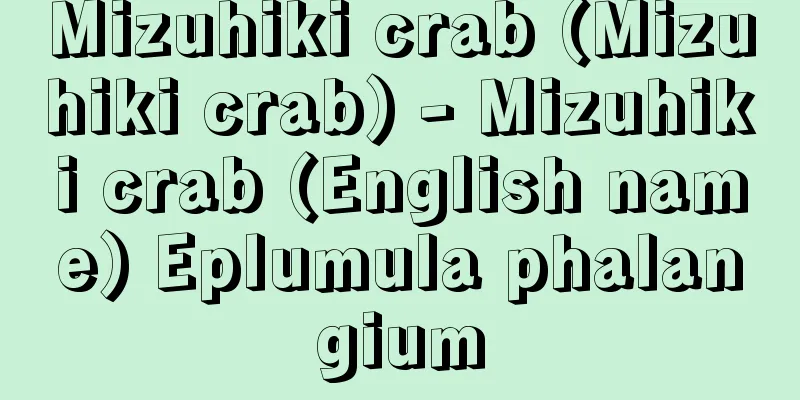Renowned

|
〘Noun〙 ("myo" is the Go-on pronunciation of "name")① A noble name. ※Man'yoshu (late 8th century) 6/1009, left note "The noble name of the imperial family was bestowed upon the Tachibana family of the foreign family, and it has already died out." ② (adjective-verb) Something that is highly renowned. Something that is famous. Also, the state or name of something. Koumei. ※Makura (late 10th century) 103 "This is Enutaki with such a name." ※Wakakishu (around 1377), Waenzo no Shu rhymes "Coming from the south to China, he has long been known for his great fame, and has never been known before ." ③ (━suru) To perform a feat. To achieve military feat. Also, the result of that feat. Fame. ※Yasunori Treasure Collection (around 1179) Vol. 1 “Famous for crossing the Katsura River” ※Ukiyo-zoshi, Buke Giri Monogatari ( 1688 ) Vol. 4 “Famous for crossing the Katsura River in the past, the granddaughter of some governor who was famous for her hidden presence at the Battle of Sekigahara” [Etymology] (1) The original meaning of the Chinese word is high fame, that is, a public evaluation of something as being excellent or superior. Starting with the example “The Pillow Book,” the majority of examples up until the end of the Heian period had this meaning. (2) From the early Kamakura period, especially in war tales, the meaning and usage of the term ③ was derived, and thereafter, examples of this meaning came to dominate. (3) Originally, there were two ways to read the pronunciation of the character "koumyo" (high fame), Kaumyo and Kaumei. However, there was also "koumei" (achievement), and by the end of the Muromachi period, when the distinction between kou and kau had become unclear, cases of confusion arose due to their semantic similarity. In the Edo period, the awareness of the distinction between myo and mei had faded, and the confusion had progressed. After the Meiji period, "koumyo" (achievement), which means merit, came to be written exclusively as "achievement." → Origin of the word "koumyo" (achievement) Koumei cow… [famous]Source: The Selected Edition of the Japanese Language Dictionary About the Selected Edition of the Japanese Language Dictionary Information |
|
〘名〙 (「みょう」は「名」の呉音)① 高貴な名前。※万葉(8C後)六・一〇〇九・左注「辞二皇族之高名一賜二外家之橘姓一已訖」② (形動) 名声が高いこと。有名なこと。また、そのさまや、その名。こうめい。※枕(10C終)一〇三「これやこのかう名のゑぬたき」※若木集(1377頃)和遠蔵主寄韻「南来万里到二中国一、久聞二高名一未二相識一」③ (━する) てがらをたてること。武功をたてること。また、そのてがら。功名。※康頼宝物集(1179頃)上「桂川渡りに高名する」※浮世草子・武家義理物語(1688)四「過にし関ヶ原陣に高名(カウミャウ)其隠れなき何の守とかやの孫娘」[語誌](1)漢語の原義は、高い名声、すなわち、立派だ、あるいは優れているという世間的評価の意であり、挙例の「枕草子」をはじめとして、平安末期までは、その意味の用例がほとんどである。 (2)鎌倉初期から、特に軍記物語において、③の意味用法が派生し、以後、この意味の用例が圧倒的に多くなる。 (3)もと、「高名」の字音についてはカウミョウ、カウメイの二通りの読み方があったが、別にコウメイと読まれた「功名」があって、コウ、カウの区別が乱れた室町末期に至ると、意味的近似から混同する例が現われ、江戸時代には、ミョウ、メイの弁別意識も薄れて混同が進み、明治以降は、手柄の意の「コウミョウ」を、専ら「功名」と表記するようになった。→「こうみょう(功名)」の語誌 こう‐めい カウ‥【高名】出典 精選版 日本国語大辞典精選版 日本国語大辞典について 情報 |
>>: Vein - komyaku (English spelling) vein
Recommend
screen musical
...A major Hollywood genre along with westerns an...
Guest House 2nd Period Culture - Guest House 2nd Period Culture
…The representative sites are Wangwan in Luoyang,...
Movement to overthrow the shogunate
A political movement aimed at overthrowing the Edo...
Haibutsu Kishaku - Haibutsu Kishaku
Generally, it refers to religious policies, moveme...
Toshihiko Sakai
A socialist from the Meiji to Taisho eras. Born N...
Feudal society
A society that follows ancient society and precede...
Common wheat
A perennial crop of the grass family, it is the st...
Women's Friends - Fujin no Tomo
A monthly women's magazine published by Fujin...
hōrologion (English spelling)
… Wind has been closely related to daily life, as...
Leptoptilos dubius (English spelling) Leptoptilosdubius
… [Hiroyuki Morioka]. … *Some of the terminology ...
Epagomene - Epagomene
…A solar calendar originating from ancient Egypt....
Buchkunde
… Compared to Britain, American and German biblio...
Old World Oriole (Korean bush warbler)
Oriolidae is a general term for birds in the passe...
bellbird
...Many species exhibit unique behaviors when for...
angle of incidence
… [Names of wing angles] During flight, the wing ...



![Prince [town] - Taishi](/upload/images/67cc16f1d1bb4.webp)





